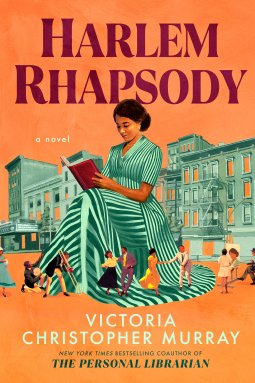Page 4 of 4
There are currently 27 member reviews
for Harlem Rhapsody
-
Linda J. (Urbana, OH)
Harlem Rhapsody
I was eager to read this book by Victoria Christopher Murray since I truly loved "The Personal Librarian" which she co-wrote. Although interesting and educational, this book did not live up to my expectations.o I was not aware of Jessie Rodman Fauset and her influence on writers of the Harlem Renaissance whom I do know about (Langston Hughes, Countee Cullen, and even Zora Neale Huston). Even though the chapters were relatively short, I wasn't glued to the book. I could and did put it down for longer periods of time than are usual for me. I WILL still look forward to Ms. Murray's next book and I will look for Jessie Rodman Fauset's books and poetry to familiarize myself with her work.
-
Jodi S. (Goldens Bridge, NY)
Good History
This was an interesting book about a period of time I didn't know much about - Harlem in the early 1900s. Jessie Redmon Fauset is an important historical figure who we should all certainly know more about, and I'm glad I learned about her and her work at the Crisis. I loved learning about the early years of writers whose names are now well-known, but I found myself unsympathetic to both Jessie and W.E.B. DuBois. They were both doing wonderful things for a great cause, but were they "good" people? I don't really think so. And the book was a bit drawn out and boring at times for me. Overall, I thought this book was interesting, but I didn't really enjoy it.
-
dcosbey
Disappointing read
The book was written in simplistic language, similar to a romance book.
The greatest disappointment was the unflattering portrayal of WEB DeBois as an egotistical philanderer. Although an accurate description, the story focused on his flawed character instead of his achievements. Anyone reading this book to learn more about WEB DeBois’s civil rights achievements would be disappointed or the lack of focus.
-
Maureen A. (Kansas City, MO)
Harlem Rhapsody by Victoria Christopher Murray
The novel Harlem Rhapsody centers around Jessica Fauset, an aspiring writer navigating the vibrant cultural landscape of the 1920s Harlem Renaissance. Her journey is intertwined with Crisis magazine, W.E.B. Du Bois's influential publication where she seeks to advance the careers of Black poets and writers who lack an avenue of publication in the white publishing dynasties. The novel offers an insightful portrayal of Harlem's literary and artistic explosion, featuring a vivid cast of characters. However, the transitions between chapters feel clunky, often bogged down by excessive references to famous figures and events. While names like Langston Hughes and Countee Cullen are important to the era, their constant mention detracts from the story's focus on Fauset. The novel loses momentum by frequently veering into historical references and Jessica's romantic interlude with DuBoist. Although the setting is rich and compelling, the overreliance on name-dropping can make the narrative feel disjointed, weakening the reader's emotional connection to the protagonist's struggles to guide a literary revolution.
-
Jennifer B. (Oviedo, FL)
Harlem Rhapsody
My hopes were high for this story about the Harlem Renaissance. It is a very exciting time in the history of our country, one which I am always eager to learn about. I had never heard of Jessie Redmon Fauset before reading this. I suspect not many people have. Her story definitely needed to be told, for her importance in promoting literature was immense. This book was well researched. However, I am not sure it warranted such a long saga. At times, I found it to be repetitive. It is not the first book I have read written by Victoria Christopher Murray. Nor will it be the last. It just was not her finest in my humble opinion.
-
Molly O. (Aurora, CO)
Rhapsody hits flat note
I was excited to read this new offering by Victoria Christopher Murphy about the Harlem , Renaissance in the 1910s. While I learned much about the rising literary stars of the period, I was sorely disappointed by the storytelling. Jessie Fauset , accompanied by her stepmother as her chaperone, had just arrived in Harlem to begin a position as editor of The Crisis magazine. W.E.B. DuBois, Civil Rights activist and co-founder of the NAACP, created the magazine as well as the position for Jessie as the literary editor Jessie was a talented young person but also aided by her secret affair with the married DuBois. The book slogged through endless pages of constant and tedious praise of DuBois. As the story developed, it became clear that Jessie was a woman of unbridled ambition that superseded any morality, love or respect for others. I was left wondering if Murphy really intended her as a role model for young Black women when, to me she was not a role model for women of any color.
